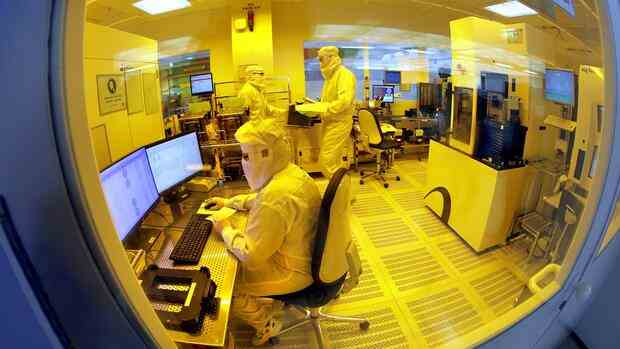Texas Instruments is sticking with the Munich location.
(Photo: Texas Instruments)
Freising When Texas Instruments (TI) opened its plant in Freising, Ludwig Erhard was Chancellor. Back then, in 1966, it was not foreseeable that the new Munich airport would one day open right in front of the company premises.
The plant on the outskirts of Munich still exists today. And it is the only production facility of the world’s eighth largest chip company in Europe, where only a few US semiconductor manufacturers have any locations at all.
Even after almost 50 years, the existence of the traditional factory in Freising is not endangered, assures Andreas Schwaiger, head of TI Germany, in an interview with the Handelsblatt. It is impossible to imagine the production network of Texas Instruments without it. Even if TI is currently investing billions of dollars in modern, new plants in the USA.
Texas Instruments produces for the German industry
This is good news for German industry, which is plagued by supply bottlenecks. Many chips are made in Freising that are extremely important for customers in this country – components for car manufacturers and numerous other manufacturing industries. “We are the specialty factory in the group,” explains plant manager Klaus Schimpf.
Top jobs of the day
Find the best jobs now and
be notified by email.
The large quantities that TI supplies to computer manufacturers, for example, do not come from Freising. Instead, the group produces components in Bavaria in a spatially close symbiosis between developers and production that is unusual for TI.
The plant manager explains what makes production in Munich special.
(Photo: Texas Instruments)
Schimpf emphasizes that the engineers here bring one or two new production processes to series maturity every year. TI is one of the few companies that work close to the customer at all. The group has 32 branches in Europe. Other semiconductor suppliers only supply their largest customers directly.
>> Read here: High energy prices are driving the business with energy-saving chips
In terms of production, TI is almost alone in Germany anyway. Of the ten chip providers with the highest sales worldwide, only Qualcomm produces in its own factory, also in Munich, alongside TI.
Globalfoundries operates a location in Dresden that is respectable even by international comparison. However, the US company is active as a contract manufacturer. TI uses such so-called foundries comparatively little. “We want to produce the majority of the chips ourselves,” says manager Schwaiger.
This is also where the company differs from competitors such as AMD, Broadcom or Nvidia, who do not have their own production facilities at all. Providers such as the Dax group Infineon have at least a significant part of their products manufactured externally.
Texas Instruments moves closer to the customers
Texas Instruments is now further intensifying customer proximity. The US group wants to open a new logistics center in Frankfurt at the end of 2024. The buyers, including many medium-sized companies, should then receive their orders within 24 hours. According to the financial information service Bloomberg, the customer list has more names than any competitor.
TI’s head of Germany explains the further plans for the location.
(Photo: Texas Instruments)
And according to Bloomberg, TI has been one of the most profitable chipmakers for decades. According to the experts, one of the reasons is that TI does not need the same sophisticated equipment for its semiconductor production as Intel does.
This also applies to the Freising plant. Here, TI produces on discs with a diameter of 200 millimeters. The industry standard is now 300 millimeters. More than twice as many semiconductors fit on a 300 millimeter wafer, which reduces the cost per chip. However, the demand for many chip types is not so high that the larger disks would be worthwhile.
No information on the investment volume in Germany
Chips with so-called structure sizes of 35 to 180 nanometers are also produced in Freising. Some of these are technologies that have been in use for two decades. The most advanced chips are produced by the contract manufacturer TSMC using a three-nanometer process. A nanometer is about as big as a fingernail grows per second.
>> Read here: Chip industry in Germany wants to play an important role in quantum computers
Nevertheless, the plant is not outdated: “Investments are made continuously,” says Germany boss Schwaiger. However, the manager does not reveal how much money is flowing.
Compared to the costs for the new buildings in the USA, the amounts should be modest. In Texas, TI will handle around $14 billion between 2022 and 2025, according to calculations by supply chain specialist Everstream.
The Freisinger management regularly travels to Texas to exchange ideas with colleagues. The fact that Munich Airport has been in sight for three decades is convenient for them.
More: This is how the semiconductor researchers in Belgium are shaping our future
